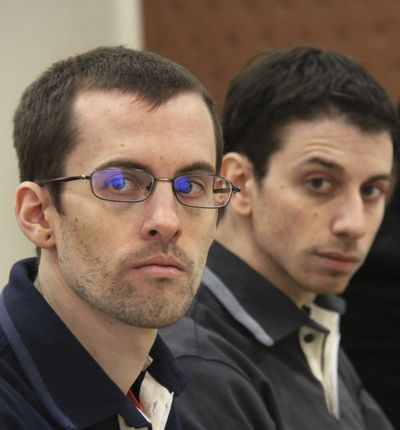Iran sentences American hikers
State TV says men ordered to spend eight years in prison

TEHRAN, Iran – Iranian authorities imposed a harsh, eight-year sentence on two Americans arrested along the border with Iraq in 2009, state television cited an unnamed judicial source as saying Saturday, in a stunning verdict that could further strain relations between the U.S. and Iran.
Shane Bauer and Joshua Fattal, who already have been held in Tehran’s infamous Evin Prison for two years, have 20 days to appeal their convictions on charges of illegal entry into Iranian territory and espionage.
Their lawyer, Masoud Shafii, said he had not been officially informed of the sentence and vowed to take the case to the appeals court, arguing that the prosecutors had failed to show any proof of espionage and that the hikers strayed into Iran inadvertently.
“In the past two years I have not seen any evidence to prove my clients are spies,” he said. “It is as if anyone carrying a toothbrush in his satchel is a spy.”
Shafii and the men’s supporters had hoped they would be freed as a gesture of goodwill during the Islamic holy month of Ramadan. President Barack Obama and other U.S. officials have repeatedly called for their release. “Shane and Josh have been imprisoned too long, and it is time to reunite them with their families,” State Department spokeswoman Victoria Nuland said in a statement.
Some analysts speculated that Iran might be using the high-profile case to embolden its primary regional strategic ally, Syria, to hold firm in the face of international pressure over its violent suppression of a months-long protest movement.
“It is sending a message to Syria,” said Reza Kaviani, an economist. “It is saying, ‘Be tough like I am – tough!’ ”
Others said the verdict would surely exacerbate tensions between Iran and the United States at a time when they are at odds over Iran’s nuclear ambitions, jostling with each other over the future political direction of Iraq and Afghanistan, and on opposite sides of the domestic political confrontations in Syria and Lebanon.
“The verdict will have a negative impact on the public opinion of America toward Iran,” said Davoud Hermidas-Bavand, a former diplomat and professor of international relations in Tehran. “When the families of the hikers talk to the media in the U.S., public opinion will sympathize with their children and their families at the expense of the Iranian regime. Public opinion naturally will call for tougher diplomacy against the Islamic Republic of Iran.”
The two 28-year-olds were arrested during what they insist was an ill-fated hiking trip in the scenic mountains of Iraqi Kurdistan. A third hiker, Sarah Shourd, 32, was released on bail last year and has been campaigning for her friends’ release.
All three are graduates of the University of California, Berkeley. Educator Shourd, who grew up in Los Angeles, and freelance journalist Bauer, who grew up in Minnesota and the Bay Area, got engaged to marry while in prison together. Fattal, an environmentalist and Pennsylvania native, was visiting his two friends in Syria when they and a fourth friend decided to take a trip to the relatively safe Kurdish enclave in Iraq.
Their case has been tried by a Tehran branch of the country’s politically charged Revolutionary Court, which handles national security cases and has been accused of failing to abide by international or even Iranian standards of jurisprudence, especially when it comes to defendants’ rights.
“This is a first trial,” said Sadegh Zibakalam, a political scientist at Tehran University. “I presume their lawyer would lodge an appeal, and the appeals court might reduce a sentence.”
But dealings between Iran and the United States have soured considerably recently. Iran has demanded that the U.S. release several of its nationals held on charges of weapons smuggling. “The relations between Tehran and Washington certainly have not helped the accused,” Zibakalam said.